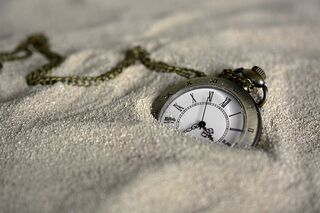Grief
How Nostalgia Deceives Us
Grief smacks us with the reality of loss. Nostalgia covers it up.
Posted March 17, 2022 Reviewed by Gary Drevitch

Nostalgia permeates the air as calls to “return to normal” crescendo. People want to return to simpler times, to innocence and warmth, to happiness and security, to being taken care of lovingly and laughing merrily with friends and family.
Innocence is not only about longing for we were a child, but also for when we were an adult before we learnt something we don’t want to know now. It’s for a time when we didn’t have to wear masks nor think about air filters; heard about but didn’t experience pandemics that altered our lives and taught us harsh lessons; and didn’t maintain relationships in the name of “busy-ness” while maintaining the fiction of having a solid social network.
Nostalgia differs from grief in its qualia, the way it feels. Nostalgia orients thoughts, words, and behaviors toward reclaiming the past as our memory presents it; grief knows there’s no going back and mourns the loss(es). I’ve written before about grief and brain injury grief. But I’m struck by how much nostalgia is currently motivating people to cry out for and do things that threaten their health and their very lives.
The pandemic isn’t over.
And we still haven’t come to terms with the changes we need to make to both recover from this pandemic and protect ourselves against the next ones. Despite that, millions sally forth into the world as if we can say it’s done and dusted and the virus will obey. Nostalgia blinds us to reality with its sentimentalism. Grief smacks us hard with the reality that loss is permanent. Perhaps nostalgia grips us so that we can avoid grief.
I find that no matter how many decades pass, the desire to return to a time when I didn’t know X pulls at me hard. This state is particularly true for relationships, and for a time when I believed family meant it when they declared blood is thicker than water, friendship bonds were promised to be unbreakable, and friends were simpatico. We shared interests, attributes, ethics, and being there for each other no matter what tried to separate us, no matter how long the time of trial lasted.
Brain injury puts pause on survivors’ lives and creates a sense of pause in their social networks even though the networks can continue to work, socialize with others, volunteer, etc. The pandemic has affected people similarly, though most haven’t had to pause their lives like brain injury survivors do.
“I think it’s been revealing of character en masse.…But any kind of severe, hard pause on our lives is unsustainable. I’ve chosen to walk away from a few relationships. [It’s been] extremely painful. Just a sense of overwhelming disappointment to be totally honest. Thinking that you had shared values with people and then just being kind of like emotionally crushed by some of the choices that people have made and…the lack of compassion and the way that people have phrased their justification for…showing a total lack of disregard for others or science.” —Dallas Curow on TVO’s The Agenda, 14 March 2022.
As with brain injury, the pandemic revealed aspects of our friends and/or family that we didn’t want to know.
On a brain injury message board I attended almost two decades ago, several bemoaned the fact that they’d learnt something about their friends they hadn’t wanted to know, had forgotten, then were re-injured when they re-experienced that same behavior. They wanted to know how to remember so as to avoid repeated emotional injury.
We need to remember so we can protect ourselves, but nostalgia entices us with the sweetness of innocence, when love and tight bonds that existed prior to brain injury express themselves after injury in calling the injured loved one malingering, lazy, or toxic, and then walking away, justifying not learning about brain injury and blaming the injured. Because society knows so little about brain injury, they accept the justifications and maintain the connections with the ones who left, not the ones who were left. Now the pandemic rolls over us, and millions of healthy people discover the same thing.
Strange how a catastrophic health event strips away the veneer of compassion, ethical behavior, and kindness.
Unfortunately, nostalgia lies to us that we can return to normal. But we cannot unlearn that a virus mutates, disables, and kills. We cannot unlearn that masks, vaccines, and cleaning the air keep us safer. We cannot unlearn that our strength as humans comes from working together and supporting each other. It’s how we survived and became the dominant species. And most of all, we cannot unlearn who our friends and family really are.
“There have been friends that we’ve not seen that we’ve stopped talking to because it’s become so divisive; you’re vaccinated and they aren’t. And they don’t understand why you did that…The loss of friends is hurtful and surprising in many cases. And you find out very quickly you don’t share a lot of stuff.” —Robert Fisher, TVO’s The Agenda, 14 March 2022.
This situation equates to having suffered a brain injury, declaring that you did, and are pursuing neurostimulation treatments. Family and friends don’t understand why you did that instead of “getting on with your life” as if, like with the pandemic, it’s an option. Only nostalgia deceives you into thinking it’s an option. Brain injury, unlike a virus that hasn’t yet infected you or perhaps created mild symptoms the first time, expresses itself violently within you. You cannot deny it, and you cannot unlearn the knowledge of living with it.
No one can return to the "normal," aka before times. Deep within oneself lies the knowledge that “normal” is a false front, that the virus (and brain injury) have so changed our world that the only response is to create a new one, one that cures health events and protects us from future catastrophes.
Copyright ©2021 Shireen Anne Jeejeebhoy




